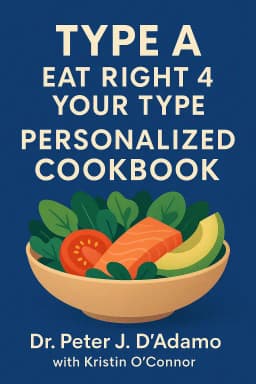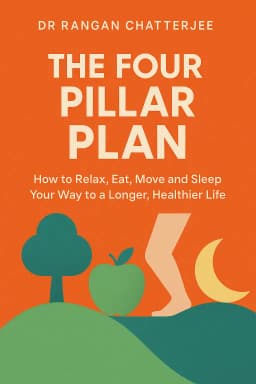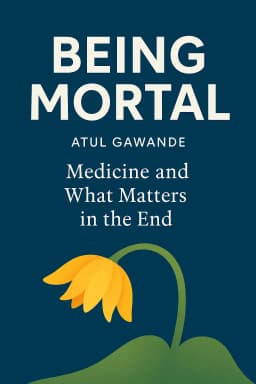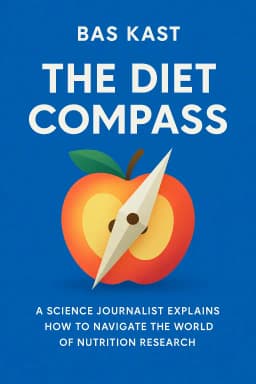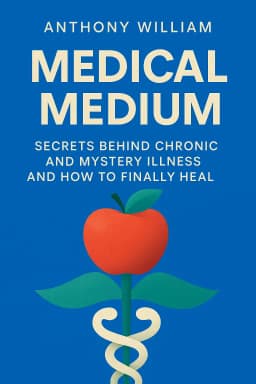
Personalized Podcast
Golden Hook & Introduction
SECTION
Orion: Imagine going to doctor after doctor. You have this debilitating fatigue, strange pains, maybe brain fog... and every single test comes back 'normal.' You're told it's just stress, or maybe, just maybe, it's all in your head. For millions of people, this isn't imagination; it's a deeply frustrating reality. But what if one book claimed all these mystery illnesses—from Fibromyalgia to MS to Chronic Fatigue—aren't a mystery at all, but the work of a single, hidden enemy?
eck: That’s a powerful hook, because it speaks to a desperation that I think many people feel. When the system you trust can't give you an answer, you start looking for a new system.
Orion: Exactly. And that's the explosive premise of Anthony William's 'Medical Medium.' Today, we're not just reviewing it; we're dissecting its powerful worldview with the sharp, analytical mind of our guest, eck.
eck: Happy to be here, Orion. I'm fascinated by systems of thought, and this one is a universe unto itself.
Orion: It really is. Today we'll dive deep into this from two powerful perspectives. First, we'll uncover the book's central villain: a super-strain of the Epstein-Barr virus said to be behind dozens of conditions. Then, we'll become historical detectives, exploring the shocking claim that many common health issues are actually the ghosts of 20th-century technological disasters. So, eck, let's start with this central villain. The book argues that the medical community fundamentally misunderstands the Epstein-Barr Virus, or EBV. They see one version, but the book claims there are over 60 varieties, and they are the real source of so many so-called 'autoimmune' diseases.
Deep Dive into Core Topic 1: The Unseen Enemy
SECTION
eck: So it’s a unified field theory for chronic illness. That's ambitious. It's also very appealing. A single culprit is easier to fight than a thousand unknowns.
Orion: Precisely. And the book uses powerful stories to make its case. Let me tell you about one from the book, a woman named Rebecca. She was a 41-year-old nurse, working in a hospital ER. One day, after a grueling 24-hour shift, the right side of her face and her arm went numb.
eck: Okay, that's terrifying. You'd immediately think stroke.
Orion: That's what the ER thought, too. They rushed her in, ran all the tests, and... nothing. No stroke. The initial doctor even suggested it might just be anxiety from her stressful job. But the symptoms didn't go away; they got worse. So, she goes to a neurologist. The neurologist listens to her symptoms, does an exam, and diagnoses her with Multiple Sclerosis, or MS.
eck: And what did the MRI scans show?
Orion: That's the kicker. Her MRI scans were completely clean. There was no physical evidence of the demyelination that you'd expect to see with MS. But based on symptoms alone, she was given this life-altering diagnosis and prescribed powerful immunosuppressant drugs.
eck: So she's given a life sentence, with no concrete proof, and a treatment that's going to shut down her body's own defenses. That’s a bleak picture.
Orion: Incredibly bleak. But then, a colleague at the hospital, another nurse, quietly suggests she look into the Medical Medium. Desperate, she does. The book's explanation was completely different. It said this wasn't MS. It was an aggressive strain of the Epstein-Barr virus that had gotten into her central nervous system and was inflaming her phrenic and trigeminal nerves, causing the numbness.
eck: So in this system, the 'autoimmune' label is essentially a placeholder for 'we don't know.' That's a powerful critique, whether the EBV part is true or not. It speaks to a deep frustration people feel with modern medicine's limits.
Orion: It completely reframes the narrative. The book gave her a protocol—not of immunosuppressants, but of antiviral foods, herbs, and supplements. The story concludes that within six months, Rebecca made a complete recovery. She was off all medications and back to work.
eck: It’s a compelling story because it offers a clear 'cause and effect' where conventional medicine offered only a label. It reframes the body not as self-destructive or broken, but as a system under siege from an external invader. That's a much more motivating narrative for someone who's suffering, isn't it?
Orion: It is. It replaces a narrative of a faulty body with a narrative of a heroic battle. And it gives you a clear enemy to fight, and as you said, a clear set of weapons in the diet. It provides a sense of agency.
eck: I'm curious, does the book explain why this virus is supposedly so misunderstood by science? How can something so widespread be missed?
Orion: This is the core of the whole thing. The author, Anthony William, claims the information doesn't come from scientific research. It comes to him directly from a divine source he calls the 'Spirit of Compassion,' and he says this information is decades ahead of where science is today.
eck: And there it is. That's the leap of faith. It moves from a testable hypothesis to a belief system. Which, for someone in Rebecca's position, might be a leap they are more than willing to take.
Orion: When the alternative is a life on immunosuppressants with no hope of a cure? Absolutely. It’s a powerful choice.
Deep Dive into Core Topic 2: Health as History
SECTION
Orion: And that idea of 'hidden information' that science hasn't found yet brings us to our second point, which is something I think you'll find fascinating, given your interest in history. The book argues that some of our biggest health crises aren't purely biological, but historical. They are echoes of our past mistakes.
eck: I'm intrigued. You're saying my health issues could be a history lesson?
Orion: According to this book, yes. Let's travel back to the 1950s. The book paints a vivid picture of the post-war boom. And in thousands of shoe stores across America, there was this new, magical device: the shoe-fitting fluoroscope.
eck: I think I've seen black and white photos of these. It's an X-ray machine for your feet, right?
Orion: Exactly! It was a metal cabinet you'd stick your feet into, and you, the shoe clerk, and your mom could all peer through viewfinders and see the bones of your feet wiggling inside the shoe in a glowing, ghostly green. It was high-tech, it was a novelty, and it was seen as the height of customer service.
eck: And I'm guessing, wildly unregulated.
Orion: Completely. The book describes how women, in particular, would get their feet zapped with radiation over and over. Kids would play with the machines. Clerks were exposed all day. Now, here's the book's connection: around this same time, in the 1950s, doctors saw a 'tidal wave' of women presenting with a new cluster of severe symptoms—debilitating hot flashes, night sweats, fatigue, heart palpitations, anxiety.
eck: And they called it menopause.
Orion: They called it menopause. It became the convenient scapegoat. But the book asks a radical question: What if it wasn't just hormones? What if it was the delayed effect of millions of women's bodies being saturated with radiation from these fluoroscopes? It argues the body was dealing with a massive toxic overload, and the natural hormonal shift of menopause was just the final straw that made all these underlying symptoms flare up.
eck: Wow. That's an incredible piece of forgotten history. It's like a silent, mass-poisoning event. So the book's argument is that the medical establishment, lacking this historical context, just saw a pattern of symptoms and slapped a biological label on it.
Orion: Precisely. And it wasn't just the fluoroscopes. The book also points to the widespread use of the pesticide DDT at the same time. People were literally having DDT sprayed on them at public pools; salesmen sold it door-to-door. The book argues this combination of radiation and chemical toxins created a perfect storm inside people's bodies, and we're still dealing with the fallout today, passed down through generations.
eck: That is a genuinely fascinating way to reframe a health issue. You know, it reminds me of how we analyze historical figures. We can't understand someone like, say, Ruth Bader Ginsburg without understanding the specific legal and social landscape she had to navigate. The context is everything. The book is essentially saying you can't understand the body's 'symptoms' without understanding the historical-environmental landscape it has endured. It turns personal health into a kind of living history.
Orion: 'A living history.' I love that. It suggests we're all walking museums of our ancestors' and our society's toxic mistakes. It's a sobering thought.
eck: It is, but it's also empowering in a strange way. It's not 'my body is failing me for no reason.' It's 'my body is struggling because it's carrying a historical burden.' Again, it provides an explanation, a story, where there was only confusion.
Synthesis & Takeaways
SECTION
Orion: So we have these two huge, paradigm-shifting ideas from the book. First, a hidden viral epidemic—this evolved EBV—as the secret explanation for dozens of mystery illnesses.
eck: And second, this concept of health as living history, where symptoms today can be the ghosts of technological and chemical disasters from decades ago.
Orion: Both are incredibly powerful because, as you've pointed out, they offer clear, compelling explanations where people often get none. They shift the blame from a 'faulty' or 'self-attacking' body to an external enemy—be it a virus or a historical toxin.
eck: And that creates a clear path forward for people who feel stuck. It gives them something to do. It gives them a sense of control. The narrative is fundamentally one of hope, which is something medicine doesn't always provide for chronic conditions.
Orion: Exactly. And it leaves us with a really interesting question for our listeners. We're not asking you to believe in a spirit that talks about celery juice.
eck: No. The question is more... what does the immense popularity of a book like this, and a movement around it, reveal about our modern condition? Is it a sign of our failing trust in established institutions? Or is it a testament to the deep, timeless human need for a story that makes sense of our suffering? It's something to think about.
Orion: A perfect place to leave it. eck, thank you for bringing your analytical lens to this fascinating, and very strange, world.
eck: My pleasure, Orion. It's a reminder that the stories we tell ourselves about our health are just as powerful as any medicine.
